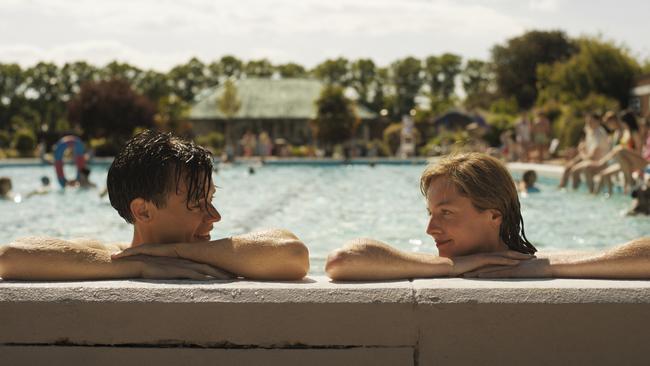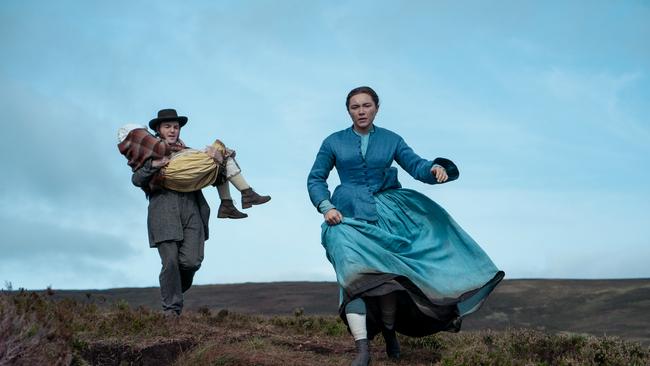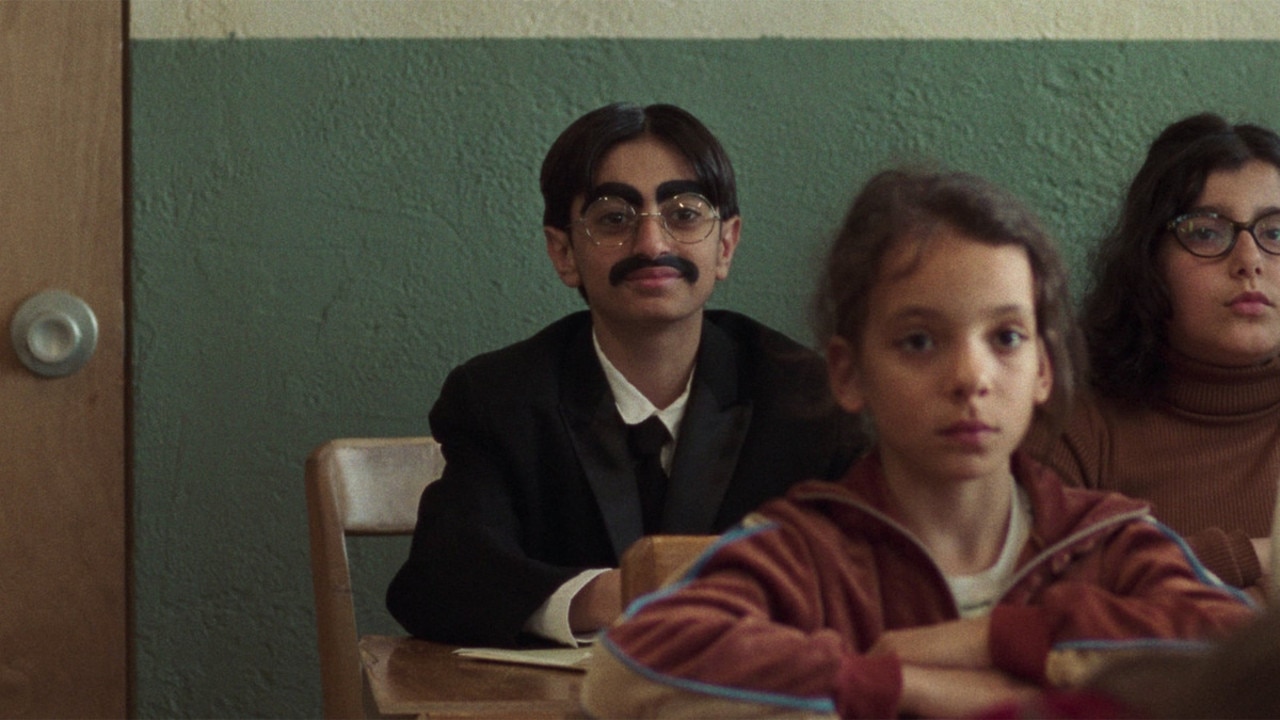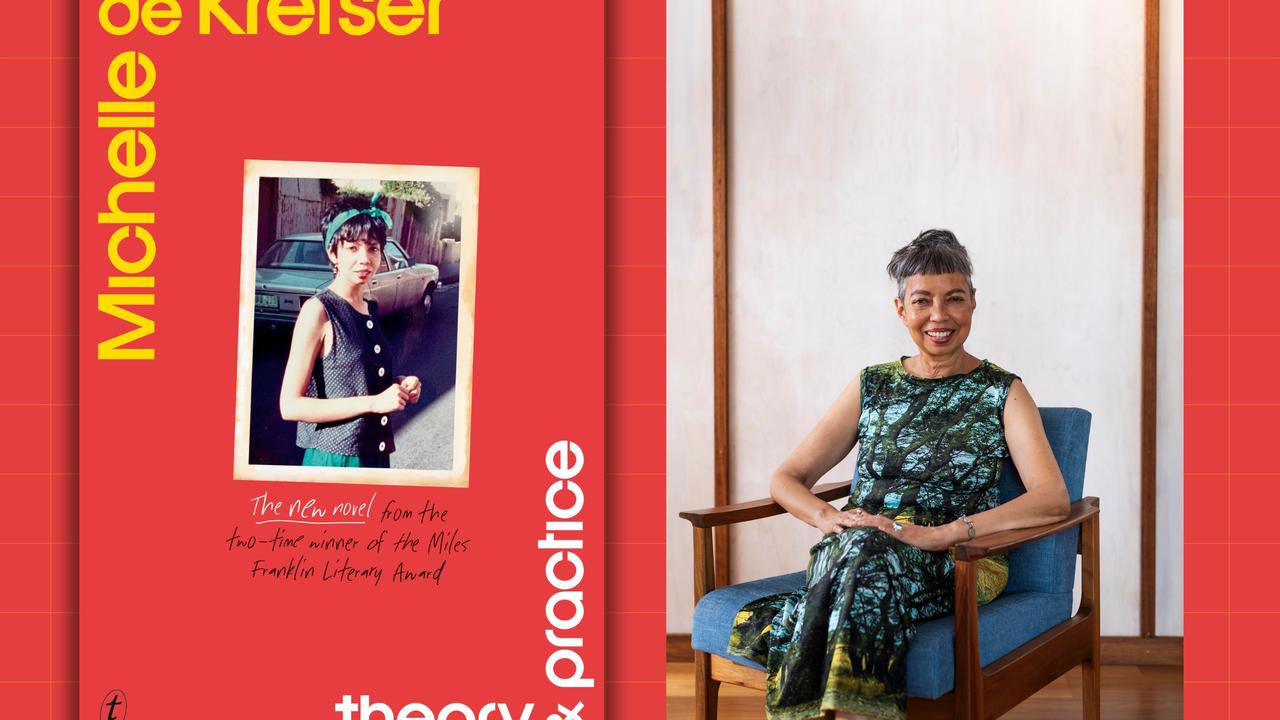Two of the best films right now: The Wonder and My Policeman
My Policeman is acutely scripted, sensitively directed and finely acted byt the pop star. It’s one of the best films out right now.

My Policeman (MA15+)
Amazon Prime
★★★½
The romantic drama My Policeman is a film of considerable emotional depth. It is about lies told, truths withheld and lives thwarted by external and internal forces.
It is acutely scripted, sensitively directed and finely acted, including by the pop star-turned actor Harry Styles, who is the policeman of the title.
It is set in the English seaside town of Brighton and centres on the lives of three people – Marion, Tom and Patrick – in two distinct time frames: the 1950s and the 1990s.
We first meet a frail Patrick (Rupert Everett) being moved into the home of Marion (Gina McKee) and Tom (Linus Roach). He has had a stroke and is desperate for a cigarette.
Marion, once a teacher, and Tom, once a policeman, are retired. Married since the 50s, they have no children.
Marion says caring for Patrick is better than putting him in a nursing home. Tom, who refuses to see Patrick, disagrees. “You know why you brought him here,’’ he tells her. “To punish him.”
As this scene unfolds, we hear Dean Martin singing Memories are Made of This. “One girl. One boy/Some grief, some joy.” As with all the music in this movie, it is well-placed.
We move to the 50s and the Brighton beachfront, where young Marion (Emma Corrin) meets handsome young Tom (Styles). When she says she cannot swim, he takes her to the pool and gives her lessons.
This sequence – the crowded, happy pool, full of women in one-pieces and white bathing caps and kids tossing coloured beach balls – is a credit to the design and costume departments.
In return for the swimming lessons, Tom asks Marion, who will soon be a teacher, to teach him about books, art and music. It is due to this, or so it seems, that the third person, young Patrick (a brilliant David Dawson), comes into their lives. He is a curator at Brighton Museum, a man of style and taste.
They go to the opera, look at JMW Turner paintings, discuss Tolstoy, drink wine, sing, dance and have fun. Here the star contributes to the soundtrack, singing I’m Going To Get All Lit Up.
It all looks jolly but appearances can deceive. Not all lies have to be told. Not telling can be a lie too.
We learn that Tom and Patrick met each other before all this artistic adventuring. The Dean Martin song needs a new line: “One girl, two boys.” Contrary to the name of the star’s one-time boy band, love can go in more than one direction.
When Patrick tells Tom he avoids police officers, Tom replies, “It’s the criminal element that causes the trouble. We just have to deal with it.”
In 50s England that criminal element included homosexuals. This role, as a sexually conflicted bobby in a time when being gay was a crime, is a bold one for Styles to take and he does it well.
This 115-minute movie, based on the 2012 novel by Bethan Roberts, is the second film directed by award-winning British stage director Michael Grandage.
The first, Genius (2016), is about the writer Thomas Wolfe and his editor Max Perkins and stars Colin Firth, Jude Law, Nicole Kidman and Guy Pearce.
My Policeman is scripted by American filmmaker Ron Nyswaner, who was Oscar nominated for writing the Tom Hanks movie Philadelphia (2013).
The two time periods are skilfully brought together. A lot changed between the 50s and 90s, but less so for Marion and Tom.
In the 90s, Marion cares for Patrick. There is a beautiful scene where she bathes him and remembers the three of them looking at a monument and running their hands over its smooth marble surface.
She also starts to read Patrick’s diaries, which were packed in a box with his other possessions when he was discharged from hospital. What she learns might be new to her, or confirm what she knew in her heart.
When Tom tells her “we settled it a long time ago”, she replies, “We didn’t settle it, we just stopped talking about it.” The key word in the title is “my”. Tom was a policeman, but whose policeman was he?
There are twists and turns about who did or said what in the 50s, secrets held and the lies the characters told each other and themselves.
It is Marion, in the 50s, who sees the truth of it early on.
“Nobody’s won,’’ she tells Tom. And yet life has to go on.
This is a thoughtful film about the lives we decide to live, the lives we decide not to live, the lives we ask others to live and the consequences of all such decisions.
The Wonder (M)
In cinemas now. Streaming on Netflix from November 16.
★★★★
Is it a beneficent act of god or a maleficent act of man? That’s the question at the heart and soul of The Wonder, a mesmeric drama based on the 2016 novel by the Irish writer Emma Donoghue.
The Wonder of the title is an 11-year-old Irish Catholic girl, Anna O’Donnell (a brilliant Kila Lord Cassidy), who has not eaten in four months.
It is 1862. Anna lives in rural Ireland – the London press describe her father as a “humble bog man” – but her starvation diet has made headlines around the world.
Asked how she survives, she says, “I don’t need to eat. I live on manna from heaven”. Asked how that makes her feel, she says, with an ethereal look on her face, “Full”.
The questioner is an English nurse, Elizabeth Wright (an intense Florence Pugh), brought in, along with a nun, to do “the watch”.
The nurse and the nun must, in shifts, watch Anna for a fortnight then report their findings to the all-male village committee, which includes the local doctor (Toby Jones) and the parish priest (Ciaran Hinds). The two women must not compare notes, or dare offer a diagnosis.
“The miracle girl” attracts visitors from around the world, who “worship her like a saint”. It’s one of them, a woman, who describes her as “a jewel, a wonder”.
They believe Anna is possessed, not demonically, as in The Exorcist, but divinely. Some leave money, which Anna’s mother Rosaleen (the young actor’s real actor mother Elaine Cassidy) says will go to the church.
When William Byrne (Tom Burke), a local lad who has made it in England as a journalist with The Daily Telegraph, returns home to cover the story, the questions start to be asked in a more secular tone.
“How is the wee faker?,’’ he asks the nurse. “Whose pawn is she?” He sees Anna’s case as “murder by degrees”.
Possible holders of that pawn include her family, for the money, the doctor, who is hoping to make medical history by proving Anna finds nutrients elsewhere, perhaps from sunlight “as plants do”, and the religious leaders, who are looking for “our first saint since the dark ages”.
When we first see Anna, she looks healthy. That changes after she becomes the nurse’s patient.
This 103-minute movie is directed by Chilean filmmaker Sebastian Lelio, who won an best foreign film Oscar for his 2017 transgender drama A Fantastic Woman. The script is written by the director, together with Donoghue and British playwright Alice Birch, whose TV credits include episodes of Succession and Normal People. It is excellent.
The other connection is the Australian cinematographer Ari Wegner, who worked with Birch (who wrote the script) and Pugh (who starred) on the 2016 film Lady Macbeth.
When it comes to cinematography and the Academy Awards, Australia punches above its weight. At the 2022 Oscars, Wegner was nominated for Jane Campion’s The Power of the Dog but lost to compatriot Greig Fraser for Denis Villeneuve’s Dune.
Fair enough. Dune is amazing to watch, especially on a big screen. But Wegner’s Oscar will come. Her acute eye for detail is there from the opening frames of The Wonder, as the nurse, in a pale blue dress, enters the grey, brown, dull green landscape she’s hired to be in.
The shadow over Anna’s life – and the lives of her family and everyone else around her – is the Great Famine, which killed at least one million people, and for which the Irish blamed the ruling English.
It’s the journalist, whose parents and siblings died in the hunger (his description of this is heartbreaking), who puts the title in a different sense. “The starvation of one more Irish child” must be prevented to preserve “the wonder in every ordinary child”. The nurse agrees. Yet she has a past that might influence her thinking about Anna. Every night she pulls out a pair of baby’s booties, takes a drug and drifts off into another place, perhaps a previous one.
Anna, too, has a past loss. Her older brother is dead. We are not told how but his death is central to what she is doing. She fasts and prays. This is a girl who believes in the permanent scorching of hell.
When it comes to setting up a must-read/watch story and then changing it without diminishing it, Donoghue is one of the best. Her 2010 novel Room is a good example. A five-year-old boy and his mother are imprisoned in a room. It’s the boy’s only world. But halfway through that changes. Donoghue received an Oscar nomination for her script for the 2015 film adaptation.
There’s a similar outcome in The Wonder. We learn what is happening well before the end. And, as in Room, the story becomes only more compelling as a result.
It’s telling that The Wonder, distributed by Netflix, has a pre-Netflix cinema release. Post-Covid, that has returned to being a requirement for Oscars eligibility. If this film is nominated, I will not be surprised, particularly when it comes to cinematography.





To join the conversation, please log in. Don't have an account? Register
Join the conversation, you are commenting as Logout